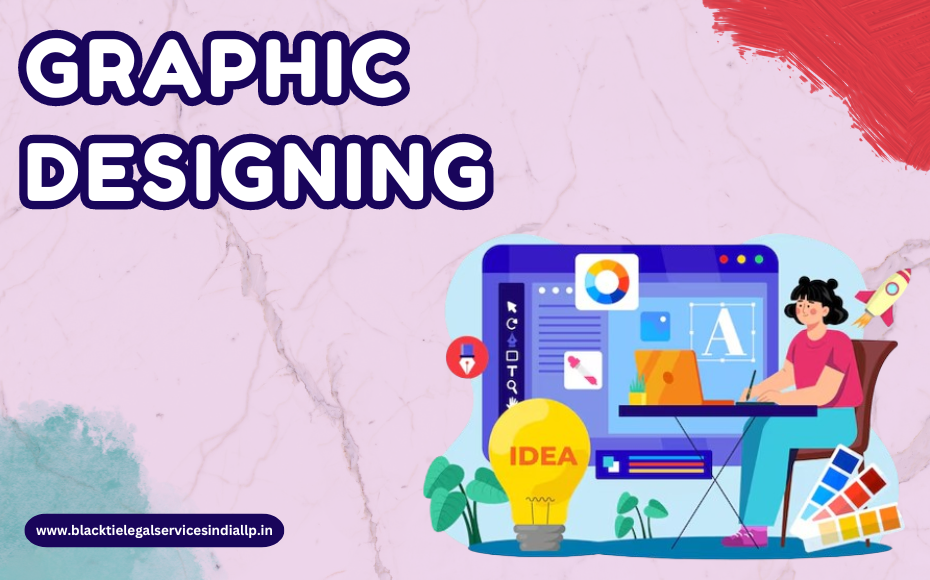Graphic Designing

Graphic designing is artistic work and the use of technologies in presenting diagrams and messages on or through screen or paper. This is a very important aspect of today’s marketing and branding as well as in digital media platforms to dictate how many companies and personalities communicate and promote themselves to the society.
Making visuals effective to improve conveyance, pleasing to the eyes and mind to make the foremost impact, is an absolute boon for organizations to construct strong brands and strategic marketing.
At Blacktie Legal Services India LLP, what is given great importance is the quality of the graphics and how they reflect the business success level of the teams and companies. This article explains what graphic designing is, its purpose, methods, areas of use and possibilities of its development

Free Consultation by Expert
What is Graphic Designing
Graphic designing is defined as creation and implementation of visual solutions to communicate messages to the target audience. This is the process of incorporating graphics along with the use of type and arrangement to produce visual communications that are efficient.
These elements are employed by designers in order to communicate various messages, to educate, to convince or to emotionally appeal to the audience. Graphics can be seen and felt in the logo and branding, in the website, in the advertisements, in everything that has been designed for visual consumption.
History of Graphic Designing
It is essential for a graphic designer or an individual working related to graphics to know about the history of graphic designing hence, all its aspects have been explained in a reasonable manner below:
Early Beginnings
Graphic design originated in early and prehistoric times, with the use of symbols, carvings, and paintings to pass on information. The first use of graphics can be dated back to a pre-historic era when people used striking pictures like the mentioned cave paintings as well as hieroglyphics, which were used to tell or illustrate stories, rituals, and any other crucial information.
The Printing Revolution
The development of the mechanical movable type printing as a key technology in the 15th century with the credited invention of the printing press by Johannes Gutenberg gives special importance to graphic designing. This revolutionized the means of making books and written documents as well as information more accessible and paved the way for the creation of typography and layouts.
The Industrial Era
The rise of better printing and cheaper printing due to the availability of better technology during the Industrial Revolution in the 19th century therefore led to an explosion in the use of posters, advertisements, and packages. This period can be considered the beginning of graphic designing as a profession in which designers created aesthetically pleasing and persuasive advertising materials.
The Digital Age
The last decades of the twentieth and the beginning of the twenty-first century saw the emergence of the digital era in graphic designing with computers and such programs as Adobe Photoshop and Adobe Illustrator. New media helped designers to explore several styles, methods, and interactivities, which resulted in the contemporary and richly varied nature of Graphic designing.
Principles of Graphic Designing
Balance
Balance refers to the way in which visuals are distributed in a design to create a sense of harmony. Balance is easily achieved by means of an asymmetrical or symmetrical arrangement, which can be assured that the weight of the rest does not matter when compared with the rest.
Contrast
This is a technique of applying different colors, forms, sizes, and touches to gain attention towards the special parts. Good contrast plays the role of a useful indication of the viewer and contributes to the quality of the design.
Alignment
Alignment means that objects in a design are properly placed so that they can complement each other. This leads to a well-aligned document that has a pleasant to the layout, which makes it easy to comprehend the given content.
Repetition
Repetition is the ability of the same elements or even style to be employed all over the design so as to unify the communication signal. It also assists in branding since it creates awareness of the design and makes the brand stick in the minds of the consumers.
Typography
Typography is defined as the process of printing and display of text in a pleasant and readable format. It pertains to the selection of properly typeface fonts, sizes, and distances as well as proper aligned to improve the design’s communicative message and beauty.
Tools for Graphic Designing
All the information about tools for graphic designing is explained in a reasonable manner below:
Adobe Creative Suite
Many designers use Adobe Creative Suite; This includes tools like Photoshop, Illustrator, and InDesign that are preferred in the graphic design profession. These tools provide countless options for photo retouching, vectorial drawing and layouting and hence are very useful tools for professional designers.
CorelDRAW
CorelDRAW is also one of the widely used graphic design tools available in the market which mainly includes the features of a vector graphic editor. Today, it is recognized as one of the primary tools for logo design, illustration and print media.
Canva
Canva is an easy-to-use online graphic design tool for users who have little knowledge of graphic design. That’s why it’s perfect for creating infographics, social media posts, presentations, and marketing collateral
Figma
Figma is a collaboration tool for UI/UX design. It enables different designers to design a particular project together and thus becomes an effective tool for collaborative work on a project.
Procreate
Procreate is a digital painting application that runs on iPad that is widely used by the illustrator and digital artists. Many brushes and tools are provided to create clear and colorful artworks in its function.
Applications of Graphic Designing
Applications of Graphic design are one of the all-important aspects of this article, which we have explained very well below:
Branding and Identity
This is a common truth in graphic designing. This means coming up with a logo and other related items such as business cards, letter-heads as well as other marketing materials that the company wants to adopt. This makes it easier to attract the audience as it builds trust in them as they always associate certain products with a particular brand.
Marketing and Advertising
The marketing role of graphic design focuses on designing various materials aimed at the target consumers to influence their buying habits. This counts for designing brochures, fliers, posters, graphics for social network profiles and accounts, and advertisements for computer and internet usage.
Web and App Design
Graphic designing is important in the contemporary world to ensure optimal and aesthetic website and application designs. This subcategory means developing interface layouts, icons, buttons and all patterns, which facilitate the use of applications and services.
Print Media
The print media is still significant for the different tasks, including magazine and newspaper design, book layout, and packaging design. This is because print designs usually involve intricate details as well as mastery of matters relating to the printing process and the media used.
Motion Graphics
Motion graphics is a technique of graphic designing with animation to produce impressive visual material for video, presentations or display systems. This they do by creating animated logos, title sequences, explainer videos, and interactive media.
Future Trends in Graphic Design
It has been told about the future trends in graphic designing that from generation to generation, there is a lot of development in the mentality and technology of all people. Hence, we have said something about the future trends in graphic designing below:
Minimalism
Minimalism has become prominent in the world of graphics and prints and one of its trends remains simplicity. This approach entails the use of straight unbroken lines, ample white space and restricted use of colors in order to produce good and serviceable designs.
3D Design and Typography
With the development in technology, 3D design has become easier creating near life models for the designers. Among all the types of typography, 3D typography is getting more and more popular with its feature of creating more width and depth on the lettering.
Augmented Reality (AR) and Virtual Reality (VR)
Both AR and VR are set to revolutionize the design field. They create new ways of interactivity and new opportunities for showcasing products in virtual space and developing augmented reality advertisements.
Artificial Intelligence (AI) and Automation
Technology has taken a toll in increasing the creativity of graphic designs by automating most of the tedious tasks. Software solutions that rely on artificial intelligence can also create design alternatives, bring possible enhancements to a designer’s attention, and complete routine tasks, thus freeing up designers and letting them handle more complex and vital issues.
Conclusion
Graphic design is one of those fields that is dynamic to the extremes through the growing merger of art and technology, under which lies the responsibility of developing printed media that convey relevant messages in an effective and credible manner.
Hence, Blacktie Legal Services India LLP specializes in providing services and support for exceptional graphic designs that play a vital role in building valuable brands, attracting consumers, and achieving success in business. Whether you need logos, business cards, flyers, an original website, or custom illustrations, our team of professional designers is ready to fulfill your imagination.
Talk to us today and learn how we will help your brand get the recognition it deserves in a highly saturated market with our graphic design services.
What we are offers in Graphic Designing
At Blacktie Legal Services India LLP, our team of skilled graphic designers is dedicated to helping clients achieve their visual communication goals. We offer a wide range of services, including:
- Logo Design: Landscaping a logo that would be associated with a company in an effective and spectacular way.
- Brand Identity: Creating a style guide specifically concerning the color scheme, fonts, and graphic designs.
- Print Design: Graphic design involves coming up with layout, typography, illustrations, and colors to be used in production of such items as; pamphlets and folders, fliers and cards, billboards and containers, and among others.
- Digital Design: Web graphic designing for websites, social media marketing, newsletters, and online marketing campaigns.
- UI/UX Design: Physically creating and developing interfaces of sites and applications to make them comfortable to use by the users.
- Illustration and Infographics: Designing exceptional illustrations and infographics.
